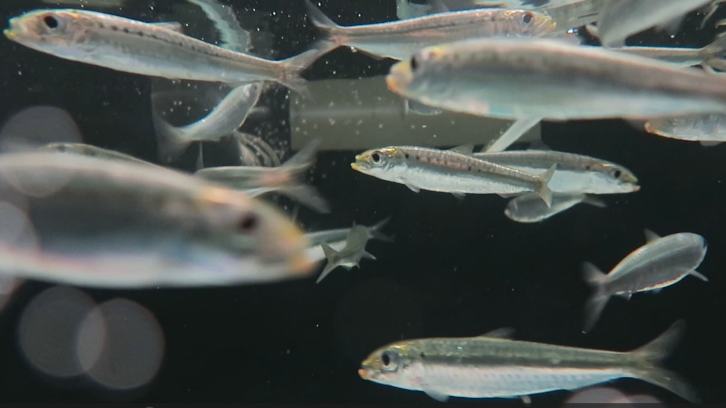Between plastic and climate change: emerging challenges for sardines

The SEAaq research group from UAB has participated in the study on the effects of temperature and feeding habits on the ingestion and expulsion of plastic fibers by European sardines. The article demonstrates that the way sardines feed, which is changing due to the reduction in plankton size and worsening their feeding efficiency , increases the likelihood of consuming more plastic fibres.
The SEAaq research group (ecosystem and aquatic animal health) from the Universitat Autònoma de Barcelona, in collaboration with researchers from IFREMER (Institut Français de Recherce et d’Explotation de la Mer) and CNRS (Centre National de la Recherche Scientifique) in France, has analyzed how plastic fibers that pollute the oceans and seas like the Mediterranean are ingested by the European sardine (Sardina pilchardus). The research was funded by the project PLASMAR (R&D&i “Research Challenges” project from the Spanish Ministry for Science, Innovation and Universities) and the travel grant UAB ESTPIF 2022-29.
The research was conducted using an experimental system under controlled conditions. This allowed for the analysis of how factors like feeding behavior and temperature affect the ingestion and subsequent expulsion of plastic fibers by sardines, and to infer some of their potential negative effects. The results provide a clearer view of the threats faced by this species and add factors to consider for future conservation efforts.
The study shows that sardines can ingest plastic fibers present in the water, and their feeding behavior is crucial in this process. Sardines that feed by filtration ingest more fibers (on average, 4.95 fibers per individual) than those that directly capture food particles (0.6 fibers per individual). Additionally, it has been observed that sardines feeding by filtration have a worse body condition, mainly due to the lower amount of food ingested and not due to the ingestion of plastic fibers. Water temperature does not appear to directly affect the amount of fibers ingested, but it does affect the time it takes for them to be expelled. At higher temperatures, sardines expel the fibers more quickly, usually within 48 hours.
However, it would be misleading to think that an increase in water temperature is beneficial because it accelerates the expulsion of fibers. Climate change has caused significant transformations in marine ecosystems, including a reduction in plankton size in the Mediterranean. Sardines, which prefer to feed on larger prey because it is more nutritious, are increasingly forced to resort to filtration due to the reduced availability of larger plankton. This change in their feeding behavior not only provides them with less energy but also increases the likelihood of ingesting plastic fibers present in the water.
Although the authors of this research have not identified direct negative effects related to the ingestion of plastic fibers in the studied sardines, the study highlights that environmental changes, driven by factors such as climate change, could play a key role in modulating the impacts of these pollutants.
Nevertheless, fish consumption does not represent a concerning source of microplastics for humans. The amount of plastic fibers ingested through products like fresh sardines is minimal compared to other sources, such as the use of plastic packaging, synthetic fibers from clothing, or environmental dust that can end up in our food. Furthermore, microplastics concentrate in the stomach and intestines of fish, a part that is typically discarded during fish cleaning and preparation. Other studies conducted by the SEAaq group on fish and crustaceans from the Catalan coast also confirm that these products are safe for human consumption, as they do not present concerning levels of microplastics, parasites like Anisakis, or other pathologies.
Department of Animal Biology, Plant Biology and Ecology
Universitat Autònoma de Barcelona
References
Rodriguez-Romeu, O.; Constenla, M.; Soler-Membrives, A.; Dutto, G.; Saraux, C. & Schull, Q. (2024). Sardines in hot water: Unravelling plastic fibre ingestion and feeding behaviour effects. Environmental Pollution, 363, 125035. https://doi.org/10.1016/j.envpol.2024.125035

